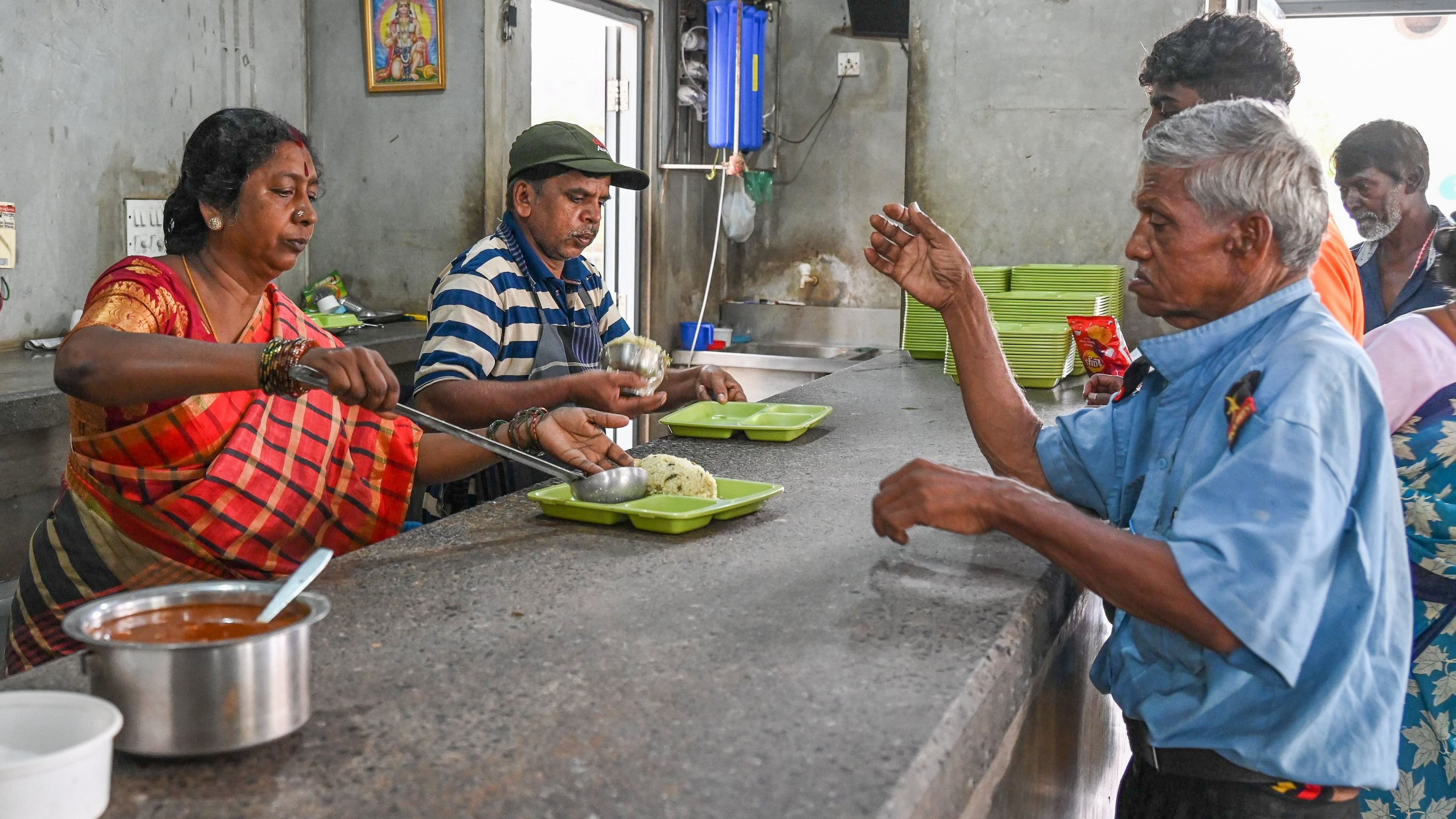
This canteen in Ashok Nagar serves a combination of rice-sambar and pulao-curd for lunch on alternate days, with upma, bisibele bath and other rice-based dishes served for breakfast and dinner.
DH PhotoS/SK Dinesh
Bengluru: Seven years since their inception, the Indira canteens appear increasingly aligned with their larger objective: serving healthy, subsidised food to the poor.
In Bengaluru, the canteens have found steady patronage, especially during the pandemic. The state government’s plans to extend their presence across the city could mark an overdue revival after an extended lull.
Urbanists and civic activists, however, argue that the canteens’ viability as a sustainable response to urban hunger will depend on their profitability and regulations that make their operations accountable and services standardised for quality.
The recent closure, and subsequent reopening, of 11 canteens could present an opportunity to the Bruhat Bengaluru Mahanagara Palike (BBMP) to revisit the operating model.
While the contracted company – Cheftalk Food and Hospitality Services – attributed the closure to BBMP’s failure in making timely payments, the civic body called it a punitive measure against the company for presenting “inflated expenditure”.
Chief Minister Siddaramaiah who launched the canteens during his previous term, in 2017, has mooted a funding model with the government and BBMP as equal contributors. BBMP received the government’s approval to float tenders for new caterers late last year but the revival plan is yet to materialise. Bengaluru has 174 Indira canteens and 24 mobile units.
Suralkar Vikas Kishor, BBMP Special Commissioner (Health) said a combination of factors including non-availability of funds and inconclusive discussions with the caterers on operating terms is adding to the delay.
Caterers claim losses
Companies that run the outlets, meanwhile, claim losses and trace them to a post-pandemic drop in footfalls. D S Patil, trustee of Adamya Chetana that runs 40 canteens in BBMP East Zone, said it was contracted to serve 300 meals, three times a day.
“During the pandemic, we used to distribute nearly 60,000 meals per day. During the past couple of years, the daily footfall has come down to an average of 15,000 across 40 canteens,” he said. While the price of grains has doubled since 2017, meals are being served at the old rates, Patil said.
Govinda Babu Poojari, Managing Director of Cheftalk, said the company has 600 to 700 staff employed across 96 outlets and seven kitchens in the South, West and Bommanahalli zones.
“During the water crisis in the city, no subsidy was extended to Indira Canteens. We had to depend on private tankers and pay huge prices,” he said. Responding to questions on accountability of services, Poojari said Cheftalk issued tokens to customers in “some” of its canteens.
The revival of the canteens is set to involve new measures aimed at better transparency in the operations. There is no centralised database that documents the footfalls at these outlets. To record the footfalls and prevent tampering of operational costs, the BBMP’s health and IT wings are establishing a face detection system for customers across the canteens, Suralkar said.
Political subtext
A 2023 survey by economist and IIT Delhi Professor Reetika Khera concluded that the canteens were also vulnerable to changes in the political dispensation. “Operations had been scaled back at several canteens in Bengaluru with only breakfast and lunch served (at the time of the survey, during the term of the previous BJP-led government). They remained closed at dinner time. These canteens hired only one person. The lone employee had to manage all tasks – billing, cash, serving, washing utensils, and cleaning the canteen premises,” she told DH.
Prof Reethika noted that the number of meals supplied to these canteens was limited and the outlets, sometimes, ran out of food by 9 am. While the shared funding formula is a good idea, the centre can make the model more viable by providing subsidised grains, she said.
On a visit to a canteen at Ashok Nagar for dinner (7:30 pm to 9 pm), this reporter saw many young women and daily-wage workers. A recent proposal to revive the menu with nutritious dishes including ragi mudde is still not implemented, a canteen employee said. A combination of rice-sambar and pulao-curd is served for lunch, on alternate days, with upma, bisibele bath and other rice-based dishes served for breakfast and dinner.
Social activist and member of Citizen Rights Foundation Alvin Mendonca highlighted the poor safety and hygiene standards followed at canteens near Millers Road, Hudson Circle, and Ejipura.
“The government needs to prescribe and ensure safety standards at these outlets by making the operating companies accountable,” he said. Mendonca said the companies that claim losses were contradicting the purpose of establishing the canteens.